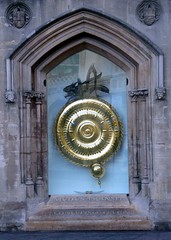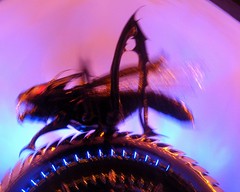January 23, 2009
Approximately 1.2 billion years from now, in a galaxy 20,000,000 light-years from the Milky Way
 As I was working on a talk I will give next week, I came across Mortal Passage by Localroger. This is a story that is part of a much bigger epic, Passages consisting of a number of interlinked short stories. They stretch over 1.2523 billion years and a couple of galaxies. I'm pretty reminded of Alastair Reynolds (especially Galactic North).
As I was working on a talk I will give next week, I came across Mortal Passage by Localroger. This is a story that is part of a much bigger epic, Passages consisting of a number of interlinked short stories. They stretch over 1.2523 billion years and a couple of galaxies. I'm pretty reminded of Alastair Reynolds (especially Galactic North).
The setting is interesting because it deliberately does not assume many standard sf assumptions: assuming the rare earth hypothesis, no FTL , maximum travel speeds around 2-4% c, and that superintelligent and/or friendly AI is likely impossible, it still manages to be a post (?) human epic. I'm somewhat sceptical of the slow development timescale of the upload economy (and why just one upload once the technology works?), which reminds me of Stapledon's 50,000 year timescale for developing spaceflight (by a united and extra smart human species). Another somewhat grating thing is the terrestrial climate disaster, where it seems that some entities must have been almost criminally negligent or incompetent not to plan for these eventualities. Maybe that is the price of not having "true" superintelligence, just a lot of intelligence - I have the feeling that the different Bringers are pretty uncreative (part of this might be intentional, with the occasional references to weird new ideas only biological humans can come up with). But it seems that even a bunch of plodding AIs would think a bit about security and emergency plans when attempting big projects near sensitive natural resources.
I think the Mortal Passage story is interesting because it deals with a brain emulation scenario that does not feel totally unlikely - I am a fan of the microtome procedure, the early and ongoing problems with setting up a good sensory reality and the many possible jobs for a virtual human. The brain editing is handled low-key but is of course the most speculative part. It is one thing to do a memory erasure, since that is likely not too different from induced reconsolidation. It is much harder to imagine how to edit a human mind to just be concerned with flying and navigation. But neuroscience is going to move fast once uploads exist - assuming we can figure out how to do ethical experiments on them. Even if a software person consented to radical experiments it is unclear whether resulting failures wouldn't have a pretty strong claim to life. The behaviour of the researchers at the start of the story is also somewhat problematic, although I can imagine medical ethics justifications for most of what they do.
 The issue of death is another aspect of the story which I find curious. There is a hint of deathism (the idea that death is good) but at the same time it is clear that there are many extremely long-lived entities around that are perfectly happy. Many of the Bringers demonstrate an equanimity towards survival that looks positively machine-like, but also makes sense in a world of copyable minds with relatively similar contents. Maybe it is the similar contents assumption that is the problem. How quickly uploads would diverge seems to be a crucial question, but it can likely not be answered before we have at least some animal emulations.
The issue of death is another aspect of the story which I find curious. There is a hint of deathism (the idea that death is good) but at the same time it is clear that there are many extremely long-lived entities around that are perfectly happy. Many of the Bringers demonstrate an equanimity towards survival that looks positively machine-like, but also makes sense in a world of copyable minds with relatively similar contents. Maybe it is the similar contents assumption that is the problem. How quickly uploads would diverge seems to be a crucial question, but it can likely not be answered before we have at least some animal emulations.
It could be that clades derived from single humans (or clades derived from humans with the right values, or even clades selected for it) might develop a group altruism that trumps normal survival-selfishness. It is intriguing to consider Hamilton's rule for when kin selection occurs could apply in a clade of minds. Relatedness would depend on similarity of ideas, and reproduction would correspond to what minds get copied. Since the reproductive costs could probably be reduced to near zero, maybe extreme clade-altruism is to be expected? So following Haldane, I should be willing to lay down my life for 1.1 copies of me.
Posted by Anders3 at January 23, 2009 07:55 PM